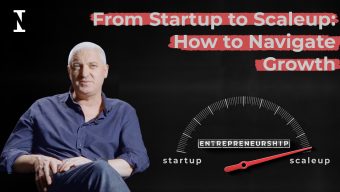Despite its many virtues, the entrepreneurial mindset has given rise to a standardized a way of creating companies and launching projects, many of which do not survive more than a few years. The startup ecosystem needs to step up and transform these organizations into scaleups—corporations with an expansion-oriented outlook, durable business models, and big commercial aspirations. With startups saturating the market, it’s time to make the transition from entrepreneur to business owner.
These two concepts—startup and scaleup—are related yet inherently contradictory, so the shift must take place in the early stages of a company’s life. To lead a scaleup, you must study the “enemy”—the startup model—in order to avoid making the same mistakes. The more you study the startup phenomenon, the better you’ll understand the scaleup movement.
Changing in order to survive
Large numbers of companies are constantly being created, all with big ambitions and expectations of growth. In the medium to long run, however, their success will largely depend on their ability to transform into scaleups.
Many new companies don’t last long in the market, even when abundant investment capital is available from various sources. The struggle for survival is the defining feature of these organizations, whose primary objective—after the initial capital-raising stage—is to adapt to a scalable business model. As most executives know, the failure to make this transition leads to the premature death of many startups.
We can define a scaleup as a company that starts with more than 10 employees and increases it staff or revenue by at least 20% annually for three years.
The hunter and the farmer
It’s not a stretch to say that startups are for survivors—or, metaphorically speaking, for hunters. The mission of an entrepreneur is akin to the vital need of the hunter: to secure resources. The process-oriented leaders of scaleups, meanwhile, are more like farmers. In the venture capital industry, it is widely understood that the hunter must secure financing while the farmer must find a sustainable business model.
With this mindset, we can define a scaleup as a company that starts with more than 10 employees and increases it staff or revenue by at least 20% annually for three years. Growth is the key factor. But the definition hints at the problem: most companies remain too small—the vast majority are SMEs—while only a small minority are truly high-growth.
Becoming a farmer requires more than just initial money and investments. You also need certain management skills: selecting human resources, retaining talent, and cultivating relationships with financial institutions, as well as other parameters that require specific training. It’s no coincidence that most unicorn startups recruit executives with these types of skills.
The transition from startup to scaleup involves constantly learning from today’s rapidly changing global environment.
The folly of short-sightedness
Startups embody one of the most common mistakes in entrepreneurial thinking: the pursuit of immediate results. Scaleups have a longer-term outlook: it takes at least a decade to create a truly valuable project that generates consistent profits and returns. The creation process is just one small step in a much longer journey. The culture of growth at any cost is a mistake. (In the words of Edward Paul Abbey, “Growth for the sake of growth is the ideology of a cancer cell.”)
The transition from startup to scaleup involves constantly learning from today’s rapidly changing global environment. The international market is the new playing field, and the entrepreneur’s initial heroism must give way to the collective ego of a staff committed to the organization’s success. Work structure is a key weapon for scaling a company. In this change of status, the founder is less important than the team and the confidence to do the job. Assembling this puzzle is a laborious but essential step in the startup’s transition towards a scalable model.
© IE Insights.











